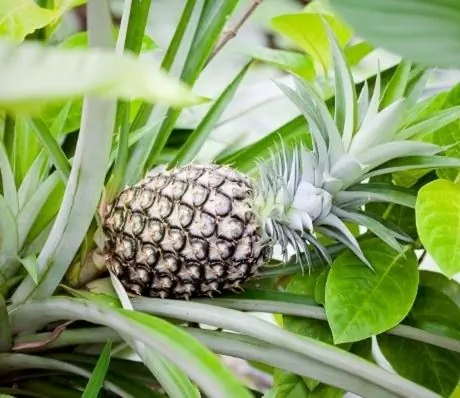- Author Rachel Wainwright wainwright@abchealthonline.com.
- Public 2023-12-15 07:39.
- Last modified 2025-11-02 20:14.
Licorice
Instructions for use:
- 1. Pharmacological action
- 2. Release form
- 3. Indications for use
- 4. Contraindications
- 5. Method of application
- 6. Side effects
- 7. Storage conditions
Prices in online pharmacies:
from 1099 rub.
Buy
Licorice is a herbal preparation, effective as an anti-inflammatory and expectorant agent.
pharmachologic effect

Licorice has a pronounced expectorant and antispasmodic, as well as anti-inflammatory and antimicrobial effects (most pronounced in relation to staphylococci).
The roots and rhizomes of Licorice contain the following active substances: carbohydrates, organic acids, tannins, steroid compounds, essential oils, glycyrrhizic acid, which, acting in combination, stimulate the functions of the endocrine glands, irritate the mucous membranes of the intestines and respiratory tract, providing an enveloping and mild laxative effect.
Decoctions and infusions of Licorice according to the instructions also have a diuretic effect, stimulating the work of the adrenal cortex, especially with its reduced function.
In addition, as a result of the use of Licorice:
- The production of mucus in the gastrointestinal tract increases (against the background of a decrease in gastric acidity);
- Healing of ulcers of the stomach and duodenum is accelerated;
- The nonspecific resistance of the organism increases.
Release form of Licorice
Licorice is produced in the following form:
- Filter bags of 1.5 g, 10 or 20 pieces per pack;
- Syrup, in bottles of 100 g and 125 g;
- Chopped raw materials (roots and rhizomes), 50 g or 100 g in a package.
The analogs of Licorice by the mechanism of action are the preparations Althea, Anise ordinary, Marsh Ledum, Oregano, Gedelix, Devyasil, Mother-and-stepmother, Pectusin, Thermopsis, Thyme, Codelak Broncho, Coldrex Broncho and some others.
Indications for the use of Licorice
Use licorice according to the instructions effectively:
- In the treatment of infectious diseases of the upper respiratory tract: bronchitis, laryngitis, pharyngitis;
- When a smoker coughs;
- In the treatment of gastritis, as well as ulcerative lesions of the duodenum and gastric mucosa;
- In the treatment of cystitis, pyelonephritis, pyelitis;
- With hypofunction of the adrenal cortex (together with other drugs).
According to reviews, Licorice can be used in conjunction with other drugs in the treatment of gout, eczema, rheumatism, hemorrhoids, dermatitis of various nature.
Contraindications
Contraindications to Licorice in the form of decoctions and infusions are:
- Increased sensitivity of the body to herbal or auxiliary components;
- Pregnancy and lactation period;
- Functional disorders of the liver;
- Cirrhosis of the liver;
- Hypertonic disease;
- Hypokalemia (lack of potassium);
- Organic heart disease, including pericarditis and myocarditis;
- Renal failure
Contraindications to Licorice in the form of syrup are also gastritis and gastric ulcer and 12 duodenal ulcer in the acute stage.
Method of using Licorice
Herbal raw materials Licorice in the form of a decoction or infusion is recommended to be taken warm.
For adults, the decoction is prescribed one to two tablespoons half an hour before meals three to four times a day; infusion - 1/3 cup half an hour before meals three times a day.
Children are prescribed a decoction depending on age - from one teaspoon to one tablespoon half an hour before meals up to four times a day; infusion - from one dessert to two tablespoons half an hour before meals three times a day.
The broth is prepared from the crushed raw materials as follows: a glass (200 ml) of boiling water is added to one tablespoon (10 g) of Licorice and kept in a water bath for thirty minutes. Then the broth is cooled to room temperature and filtered through cheesecloth. The strained broth is topped up with boiled water to 200 ml.
To prepare the infusion from filter bags, pour three packages of Licorice with a glass of boiling water (200 ml), cover with a lid and leave for twenty minutes.
The use of Licorice in the form of a decoction or infusion from plant materials is effective for a duration of two to three weeks.

Licorice root syrup is taken orally, lasting up to ten days.
Adults are recommended to take 1 dessert spoon diluted in 1/2 glass of water three times a day.
Licorice syrup for children is usually prescribed:
- Up to 2 years old - 1-2 drops several times a day;
- 2-12 years old - 1/2 teaspoon, diluted in 1/4 cup of water, three times a day;
- Over 12 years old - the dosage is doubled.
Side effects of Licorice
With prolonged use of Licorice, according to reviews, you can observe:
- Swelling of tissues, which are caused by a violation of the water-salt balance;
- Increased blood pressure;
- Decreased concentration of potassium in the body (hypokalemia);
- Reproductive system disorders.
In some cases (in the presence of sensitivity) Licorice, according to reviews, can cause allergic reactions.
Storage conditions
According to the instructions, licorice preparations are recommended to be stored in a dark, dry place out of the reach of children. Shelf life - 24-36 months (depending on the dosage form), ready-made broth - no more than 24 hours (subject to storage in the refrigerator).
Licorice: prices in online pharmacies
|
Drug name Price Pharmacy |
|
NOW Licorice Root Licorice 450 mg capsule 100 pcs 1099 RUB Buy |
Information about the drug is generalized, provided for informational purposes only and does not replace the official instructions. Self-medication is hazardous to health!






